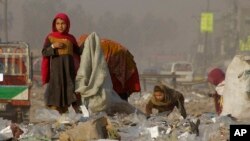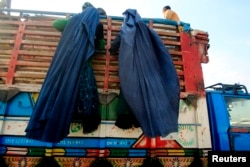Authorities in a Pakistani border province say steps are being taken to prevent police harassment of Afghan refugees, but those with no legal status still will be arrested and deported.
Pressure has grown — particularly from host communities — calling for authorities to send Afghans to their home country, citing economic and security concerns.
Recent political tensions between Pakistan and Afghanistan have added to the challenges for one of the largest and most protracted refugee situations in the world, according to the United Nations.
But the leader of the political party ruling the Khyber Pakhtunkhwa (KP) border province where most of the Afghan families are settled says that efforts are being made to ensure a "comfortable" stay for Afghans who are there legally.
He told VOA that he has met with and organized meetings between the Afghan ambassador to Pakistan Hazrat Omer Zakhilwal and provincial government and police chiefs to look into problems, including allegations of police harassment and extortion.
"There is no doubt that these are people living in desperate situations and they are not there out of their own will. It is because of the situation in Afghanistan and it is our duty to ensure that they live as comfortably as we can make them live," said Imran Khan, chairman of Pakistan's Tehreek-e-Insaf (PTI) party.
Local and U.N. refugee officials estimate there are three million Afghan refugees residing in Pakistan, including an estimated one million undocumented Afghans. Most of the refugee families have been living in exile for nearly four decades, after fleeing conflicts and persecution in their homeland.
KP province, which borders Afghanistan, hosts most of the refugees, despite being the smallest of all the four Pakistani provinces.
Accusations of violence
Khan insisted, however, that hostility toward Afghan refugees within the host population has grown because authorities have found undocumented Afghans behind increasingly frequent incidents of kidnapping for ransom and terrorism, particularly in the provincial capital, Peshawar.
"The problem is that the locals complain about the crime, which is coming in from the refugee camps. Most of the people who are picked up, who are kidnapped for ransom in Peshawar, the calls for ransom are coming from Afghanistan. The people are picked up, taken to Afghanistan and the [phone] calls come from there," Khan said.
"What we need is the help from the seniors of the Afghan refugees who then cooperate with the police, which is what I have been trying to do, so that these criminals are isolated from the bulk of refugees," he added.
Pakistani authorities blame the violence on militant groups operating out of volatile Afghan border regions, including fugitives linked to the extremist Pakistani Taliban who are sheltering there. They also allege Afghan authorities are not doing enough to counter the illegal cross-border movement.
Afghan ambassador Zakhilwal has acknowledged efforts Pakistani authorities have been making to ease refugees' concerns.
"Yes, the situation has improved since my meetings with Imran Khan and subsequent to that with [provincial chief minister] Parviz Khattak and the KP police chief," he told VOA.
Pakistan last month granted a six-month extension to registered Afghan refugees to legally stay in the country, urging the Kabul government and international community to step up efforts for a lasting solution to the refugee crisis.
The repatriation process, however, has significantly slowed down in recent months because of the rise in Taliban-led violence and economic deterioration in Afghanistan.
Only about 6,000 refugees have returned home, compared with nearly 60,000 in 2015, prompting the U.N. refugee agency to double financial grants from $200 to $400 per person for the registered families opting to go back to Afghanistan.










